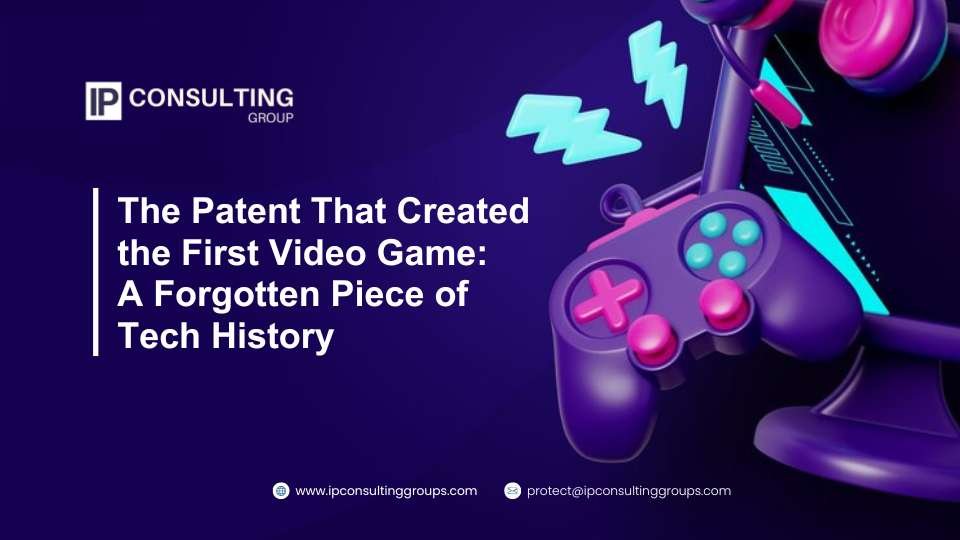The Patent That Created the First Video Game: A Forgotten Piece of Tech History
When we talk about the first video game patent, most people immediately think of Pong, Nintendo, or Atari. But the truth is, the earliest patent, tied to a video game predates these giants by decades—and the story behind it is as surprising as it is significant.
The Birth of a Digital Revolution
In 1947, long before home consoles or mobile apps, inventors Thomas T. Goldsmith Jr. and Estle Ray Mann filed a U.S. patent (U.S. Patent No. 2,455,992) for what is now widely considered the first video game. Titled the "Cathode-Ray Tube Amusement Device," their invention was inspired by radar displays used during World War II.
Unlike modern video games, this device didn’t use a computer or software. It operated by manipulating electron beams to simulate a missile being fired at targets on a screen. Players used knobs to adjust the trajectory—an interactive experience that laid the foundation for everything that followed.
Why You’ve Probably Never Heard About It
So why isn’t this part of mainstream tech history? For starters, the device was never commercially produced. The lack of mass manufacturing meant it faded into obscurity, overshadowed by more marketable and widely played titles like Spacewar! (1962) and Pong (1972).
Still, the first video game patent remains a vital part of intellectual property history. It proves that even back in the 1940s, inventors were thinking about interactive entertainment and finding ways to protect their ideas through patents.
Understanding the Role of Patents in Gaming
Gaming is a multi-billion-dollar industry today, but none of it would exist without the legal framework that protects creators. The Goldsmith-Mann invention highlights the importance of early patent protection for technology inventions—especially for pioneers ahead of their time.
Had the amusement device reached the market, the inventors could have leveraged their IP into licensing deals, partnerships, or even helped shape what we now call gaming consoles. It’s a case study in how securing patents for gaming technology can lead to long-term industry influence.
The Real Power of Early-Stage Invention Patents
One of the most fascinating parts of this story is how it showcases the value of thinking ahead. Goldsmith and Mann didn’t just invent something cool—they understood the potential value of their creation and filed a patent to protect it.
Even without commercial success, their foresight left a mark. In the world of intellectual property, being first matters. And having documentation—like a filed patent—cements that contribution in history.
This concept is key today, especially for developers, hardware engineers, and indie studios creating next-gen solutions. Filing early with the USPTO for gaming innovation patents is more than bureaucracy—it’s a strategic move that could define a career or company.
What Today’s Inventors Can Learn From This
The 1947 story teaches modern tech creators several crucial lessons:
You don’t need commercial success to own innovation. Filing a patent creates a legal claim that can grow in value over time.
Your invention doesn’t have to be flashy to be first. Even basic concepts can evolve into powerful ideas, and early documentation is key.
Gaming is still evolving. VR, cloud gaming, and immersive simulations are today’s frontier—each requiring strong intellectual property for interactive technologies.
The Evolution of Game-Related Patents
Since the first filing, the number of patents related to gaming has exploded. Companies like Sony, Microsoft, and Nintendo hold thousands of active patents—from controller designs to software processes. Patent wars have erupted over things like motion detection and user interfaces.
It all circles back to that simple cathode-ray invention—a quiet beginning that proves even the most modest idea can have lasting impact. Protecting your work isn’t just about legal defense—it’s about shaping your legacy.
Final Thoughts: Don’t Let Your Breakthrough Be Forgotten
Just like Goldsmith and Mann, today’s creators stand at the edge of innovation. Whether you're building indie games, designing new hardware, or experimenting with virtual experiences, your invention deserves legal protection.
At IP Consulting Group, we specialize in turning your creativity into defensible assets. We understand that the next big thing often starts with a small, brilliant idea. Let us help you protect it with the best patent attorney in USA so your work isn’t lost to history.
Don’t wait for recognition—secure it.

